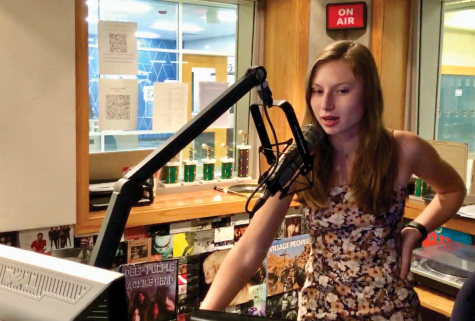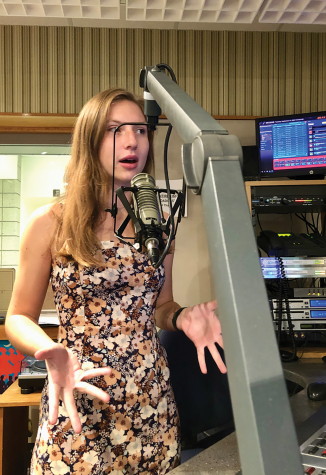Loud and Clear
Student, WHJE adviser, NPR journalist share insight on importance of radio

Caroline Houck, co-host of WHJE live show “In Her Zone” and senior, is acquainting herself with her new role as WHJE Live Shows manager for this school year. Houck said she believes radio took on a newfound importance recently that was less present prior to the pandemic.
“I think people are looking for different outlets. Like, I could say that I know that, especially over quarantine, I started listening to podcasts more, no matter if that’s crime podcasts, or whatever it is,” Houck said.
“I just think access to information is definitely a very prevalent thing this year, in general and having been able to just flip a switch and turn the radios pretty much the easiest thing ever, no matter if it’s music, or if you’re listening to somebody talk to you.”
Houck is not alone in this sentiment. According to Nielsen Media Research, 25% of Americans listen to the radio more due to the pandemic and 42% say radio has helped them deal with the outbreak.
Similarly, Steven “Steve” Inskeep, co-host of “Morning Edition” and “Up First” on National Public Radio (NPR), said although there was a decrease in listeners at the beginning of the pandemic due to less usage of cars, ultimately the digital audience, and now the overall audience, rose to their highest levels ever. Inskeep said he feels this increase is a result of the steadiness it provides.
“The past year for a lot of people has been extremely stressful and unsettling and filled with change, and many of us have been safe and at home, but it’s still been weird and stressful and some of us have (had) people close to us die or people have lost jobs and they have extraordinary trauma to deal with,” Inskeep said. “And we have tried to remain steady through all of that, that when you turn on the radio in the morning, or whenever it is that you listen, that we’re there.”
However, this increased importance comes with extensive changes––safety precautions. WHJE radio adviser Dominic James said there are several ways in which WHJE stays safe while broadcasting.
“In the live studios, we’ve insisted that people have to wear masks all the time. We did invest in some quite fancy masks to begin with, which look a little bit like dog masks so that people’s mouths weren’t obscured in any way. We’ve had quite a lot of Zoom calls and Zoom-based podcasts as well,” James said.

“I’ve had to be quite strict about moving people on and being a bit grumpy about that sometimes. But to be honest, I don’t think it’s things people do deliberately (that are dangerous), they kind of just forget, and now understand that I have to be quite sharp sometimes about people leaving food and that sort of thing.”
Inskeep said there are safety precautions that NPR staff members take as well. Moreover, he said reliability is imperative in radio.
“I feel that I’ve become, if it is possible, more absolute over the last year about being very sure that we are conveying to people reliable information and only reliable information. In those instances where a public official says something deceptive or whatever, we want to be ever more careful to make sure that we’re not just unknowingly passing on their deception,” Inskeep said. “We need to keep track of public officials when they are saying things that aren’t true. You may even need to report the untrue things that they said but you want to say this thing that he’s saying is false, you want to be really clear about that. And I think that (my colleagues and I) have all learned from experience or further experience within the last year.”
Houck said she agreed that reliability is crucial with the increased reliance on radio stations, such as WHJE, for information.
“I think that people’s access to information has definitely been boosted up, we’ve, this year, the most we ever had, updated our Instagram, our Facebook, our Twitter, no matter what social media it is,” Houck said. “Also we’ve been updating things (on our website) constantly. We have a lot of shows that also highlight news and stuff like that, also constantly being updated.”
In addition to this reliability, Inskeep said a holistic viewpoint of stories is beneficial in telling stories in an authentic manner to reach a wider audience.
“(In my occupation), one day you are interviewing the president of the United States and another day you’re interviewing Bruce Springsteen. But another day, you’re interviewing a voter in Gwinnett County, Georgia or Cincinnati, Ohio, or in my home state, (Indiana), and you’re meeting people who have all these different experiences that are interesting and you’re constantly drawing on your past interviews and your past knowledge to inform what the person in front of you is saying and that’s been really rewarding,” Inskeep said. “If you’re just covering one thing, you may become very knowledgeable but you may struggle a little bit to fit it into the wider world, and in my position, I get to fit things together. What does life in the military have to do with racial justice? What does racial justice have to do with movies and literature? What do movies and literature have to do with politics? What does politics have to do with economic equality? Like, everything that you cover gives you a new angle on other things that you’ve covered, which is unlike any other job that I can imagine, really.”

